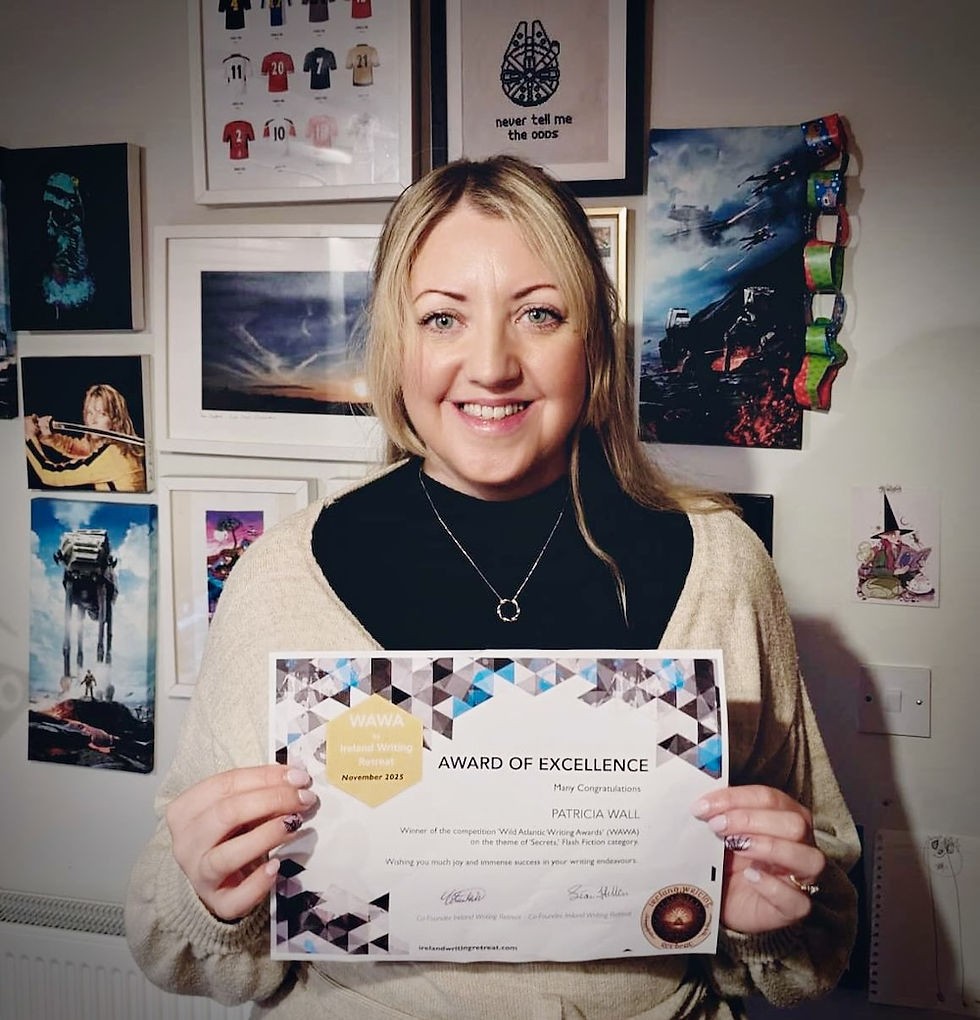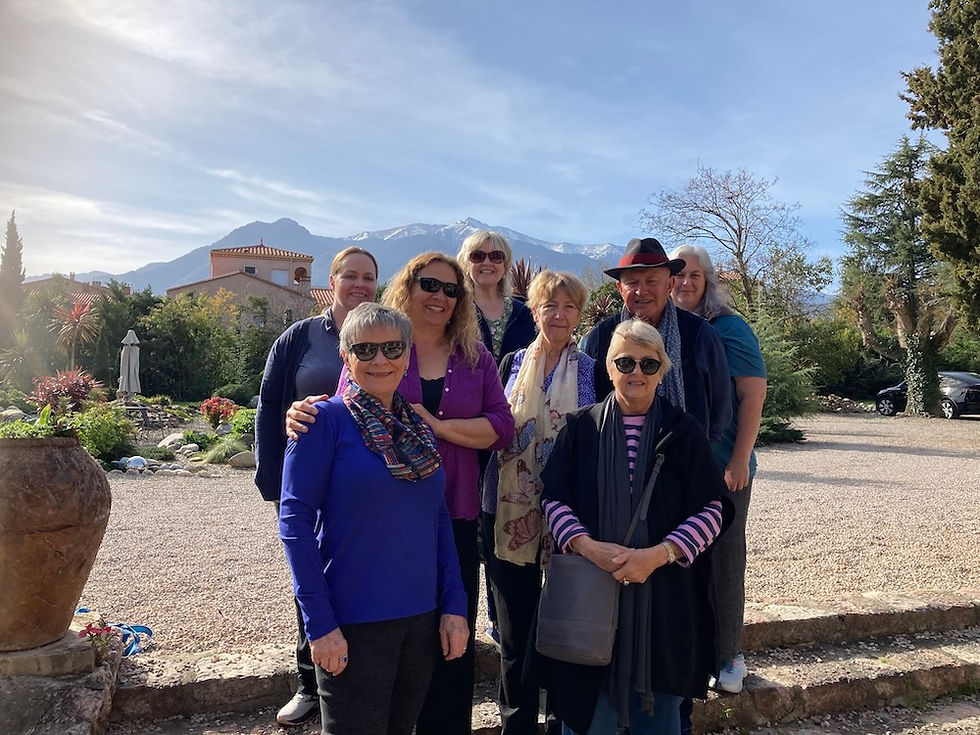Stories to Help You Celebrate Samhain
- columbiahillen

- Oct 31, 2020
- 5 min read
As I am sure you are all working furiously on your winning entries for the second edition of Wild Atlantic Writing Awards (WAWA), we'd like to offer you encouragement by continuing to share with you some stories that reached the final round of our inaugural competition.
Michelle Wright, from Melbourne, Australia, was among the Top Ten in our Flash Fiction category for the first edition of WAWA competition and Donna Harkin, from Donegal, Republic of Ireland, was among the Top Ten in our Creative Non Fiction category.
We wish you a Happy Samhain weekend and look forward to reading your creative entries in our new competition over the coming weeks.
Names

“I think I’m finally getting somewhere with my main character,” she tells Jason. “He’s coming into focus.”
“Oh, really?” he says. “Because you said you were finding him difficult to define.”
“I just needed to spend more time with him. Work out a few small details. Give him a name.”
“That’s good,” says Jason. “So, what name did you decide on?”
She hesitates for a moment; looks him in the eye. “I think I’ll call him Adam.”
She and Jason work in the same office, but on opposite sides of the building. He started out as a colleague, but she now calls him a friend; wonders if he could be something more. He’s not an author, but he reads the stories she’s working on and tells her what he thinks. They go out to lunch occasionally and kick around the mysteries of life. She talks a lot about herself, but he eludes her questions. He’s private, enclosed.
“A dried-up kernel of a man,” is what he calls himself. “Like that character in that book.”
She likes Jason’s serious green eyes and the little lines in front of his ears that give away his age. He uses quaint expressions like, “Have you any plans?” And when he’s talking or listening to something moving or profound, he turns his head sideways and stares far away, and there are tears in the rims of his eyelids that never overflow. He just pauses while he clears his throat, and then goes on.
On Friday morning she prints a draft of her story in the copy room at work and sends it to Jason in a yellow internal mail envelope. They have lunch the following Tuesday, and she asks him what he thought.
“I thought it was beautiful,” he says. “The solitary sadness of the Adam character. His inability to be honest with his feelings. I think he’s a tragic figure.” There are tears in the corners of his eyes. “I don’t know how you make these people out of nothing. They’re just words on a page, but they feel so flesh and blood.” He pauses and clears his throat. “Where do you get your inspiration?”
“From the people I know,” she says. “Friends. Acquaintances.”
He nods and frowns. He waits for her to go on.
“When they’re not paying attention, I open them up and peer inside. Some are harder to read than others. Some are like closed books.”
He turns his head and looks far away.
“Do they ever recognise themselves?” he asks.
“Never,” she says.
“That’s strange,” he says, frowning.
“It is strange,” she replies.
He nods and rubs a dry patch on his cheek. “How do you make sure they won’t?”
She smiles. “It’s easy. All you do is change the names.”

Michelle Wright is an award-winning short story writer who brings to life a remarkable range of characters and has begun an impressively productive career as a stylish writer of short fiction, winning attention in many awards, including the 'Age' short story competition, the Grace Marion Wilson Award, and the Overland Victorian University Award. In 2015 Michelle won a Faber Writing Academy at Allen & Unwin scholarship to attend their 'Writing a Novel' course with tutors Paddy O'Reilly and Toni Jordan. Sofie Laguna, Miles Franklin-winning author of The Eye of the Sheep, said of her work: "Michelle Wright's stories are beautifully drawn portals into complex, layered, sometimes painful worlds ... Every story surprised me in a different way; I was by turns, unsettled, saddened, delighted and uplifted."
To Be A Writer
by Donna Harkin

To be a writer, one must write, and therein lays the problem.
In order to begin I set up my old, defective laptop on a beautiful, antique desk I’d bought just for the purpose of creatively writing.
That was 21 days ago.
I have since painted the kitchen, planted the garden, re-tiled the downstairs bathroom, rearranged the furniture in the living room and watched six seasons of ‘The Big Bang Theory.’ It’s not because I forgot that I wanted to write - it’s because I can’t stop thinking about it.
My activity levels have increased in response.
I have reorganised all the kitchen cupboards, drawn up plans for an imaginary woodland house, created a weekly budget to cover the next six months based on an income I will never have, cleaned the house from top to bottom, learned all there is to know about psychosynthesis and visited people I don’t even like, just to avoid it. I have meditated, walked, eaten, slept, found other interests and yet, it calls to me.
In the morning I avoid eye contact with the door that leads to my creation station and it sticks like a splinter in my mind as I move through the day. Many objects are archived in that room – musical instruments, a glass engraving kit, two sewing machines and a box of Daler-Rowney watercolour paints from six Christmases ago. They are all at varying stages of decay but with very low mileage, and they all whimper when I pass, so, I circle it.
I read about writing and writers who wrote. I watch online videos on establishing characters and the benefits of writing in the first person (or not) and I read – voraciously. I almost inhale books when I want to write, as if the taste of them, when licked by my retina, will draw me in closer and make me more intimate with my own words, giving me permission to let them fly.
In the noisy silence, I hear the cruelty that speaks in me about things like art, literature and music, pursuits not intended for the likes of me. Heart-sore and humanity restored, I resolve to overcome this repression and sit in front of the dreaded monitor.
It takes me one full hour.
I plug in the keyboard and mouse, take a trip through social media and check on the days’ news. I Google keyboards for computers, deciding that the one I have is too big and not nearly portable enough.
I wonder what Rilke would have advised and almost get up to clean the kitchen again, but I feel the sore spot in my heart, and stay to allow it speak. I grieve for words I haven’t written before I even write them, and in some reality, this realisation is enough. Opening the word document, I gently turn down the volume on scorn and rancour, and getting out of my own way I remove my 'I' and write - simply because I must.

Donna Harkin, living in Letterkenny, Donegal, Ireland is an artist in the true sense of the word, including being an avid gardener and musician, having produced a CD entitled, Tell It Like It Is.
“I’ve been writing for my own joy and amusement for about fifteen years,” said Donna, who writes mostly prose poetry but has experimented with other forms. “I love the way words can be used to create visceral experiences in the reader.”
When Donna received the news about being placed in the Top Ten she was sitting on a hospital bed waiting for major heart surgery. “My head was in a bad place when I got the good news," she responded back then. "But it couldn’t have come at a better time, I’m delighted.” Fully recovered now, Donna has just posted wonderful photos on her Facebook of her beloved poly-tunnel.








Comments